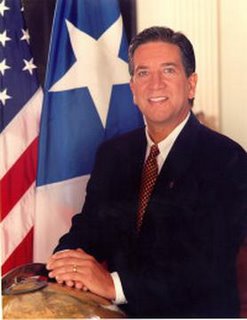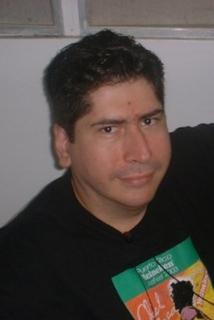Perspectiva Estadista
Nuestro destino es combatir y educar, Jose Celso Barbosa Alcala
sábado, diciembre 31, 2005
viernes, diciembre 30, 2005
Pedro Rossello tiene un grupo!

Pedro Rossello tiene un grupo de discución lo puedes ver en
http://groups.yahoo.com/group/rossello_governor_senatepresident/
martes, diciembre 27, 2005
Volvio Pedro!
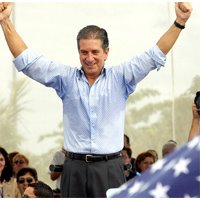
Volvio Pedro! Todo el que fue al recibimiento-demostración pudo presenciar el hecho de que el pueblo esta con la Estadidad y su lider maximo es Pedro Rossello. Se pudo palpar que el concenso en el movimiento estadista es que la unión esta con Rossello. Este reafirmo su compromiso con la busqueda de la Estadidad.
Nota aclaratoria
Nota aclaratoria la noticia titulada como Español, idioma alterno en el gobierno federal es erronea ya que su fuente lamentablemente no es oficial. La misma es una copia o parodia del website de la casablanca. El website real y oficial es www.whitehouse.gov, y el de la parodia termina en .net. Disculpas mil.
lunes, diciembre 26, 2005
ÓRDENES EJECUTIVAS SOBRE EL STATUS DE PUERTO RICO

ÓRDENES EJECUTIVAS SOBRE EL STATUS DE PUERTO RICO
El Presidente George H. W. Bush emitió un Memorando el 30 de noviembre de 1992, a los jefes de los Departamentos Ejecutivos y Agencias estableciendo la relación administrativa actual entre el Gobierno Federal y el Estado Libre Asociado de Puerto Rico. Este memorando ordena a todos los departamentos, agencias y oficiales a que traten a Puerto Rico en términos administrativos como si fuera un estado siempre y cuando que al hacerlo no se alteraran los programas o operaciones federales. El memorando del Presidente Bush se mantiene en vigor hasta que se apruebe legislación federal para alterar el status de Puerto Rico de acuerdo a los deseos expresados libremente por el pueblo de Puerto Rico.
El Presidente George H. W. Bush emitió un Memorando el 30 de noviembre de 1992, a los jefes de los Departamentos Ejecutivos y Agencias estableciendo la relación administrativa actual entre el Gobierno Federal y el Estado Libre Asociado de Puerto Rico. Este memorando ordena a todos los departamentos, agencias y oficiales a que traten a Puerto Rico en términos administrativos como si fuera un estado siempre y cuando que al hacerlo no se alteraran los programas o operaciones federales. El memorando del Presidente Bush se mantiene en vigor hasta que se apruebe legislación federal para alterar el status de Puerto Rico de acuerdo a los deseos expresados libremente por el pueblo de Puerto Rico.
El 23 de diciembre de 2000, el Presidente William J. Clinton firmó la Orden Ejecutiva 13183, la cual estableció el Grupo de Trabajo del Presidente sobre el Status de Puerto Rico y las reglas para los miembros de la misma. Esta Orden Ejecutiva delineó la política y las funciones del Grupo de Trabajo para identificar las opciones para el status futuro de la Isla y el proceso para ejecutar dicha opción.
El 30 de abril de 2001, el Presidente George W. Bush enmendó la Orden Ejecutiva 13183 para extender la fecha límite en la cual el Grupo de Trabajo debería rendir su informe al Presidente hasta agosto de 2001.
El Presidente Bush firmó una enmienda adicional a la Orden Ejecutiva 13183 el 3 de diciembre de 2003, la cual estableció los co-presidentes e instruyó al Grupo de Trabajo que rindiera sus informes según fueran necesarios, pero no menos de una vez cada dos años.
sábado, diciembre 24, 2005
Recomendaciones del Task Force (Spanish version)

RECOMENDACIONES DEL GRUPO DE TRABAJO
El Grupo de Trabajo reconoce que, bajo la Constitución de los EstadosUnidos, la autoridad para establecer un status permanente y no territorialpara el Estado Libre Asociado de Puerto Rico reside en el Congreso.A pesar de que el presente status territorial podría continuar en tanto y encuanto el Congreso lo desee, sólo hay dos opciones no territoriales reconocidas por la Constitución de los Estados Unidos que establecen un status permanente entre el Pueblo de Puerto Rico y el Gobierno de losEstados Unidos.
* Una es la estadidad. Bajo esta opción, Puerto Rico se convertiría en elEstado 51, en igualdad de condiciones con los otros 50 Estados.
* La otra es la independencia. Bajo esta opción, Puerto Rico se convertiríaen una nación separada, independiente y soberana.
La voluntad democrática del pueblo puertorriqueño es de vital importancia para el status futuro de este territorio. Idealmente, el proceso debería comenzar con una expresión del pueblo de Puerto Rico sobre si desea mantener su presente status territorial o si desea establecer un status no territorial permanente con relación a los Estados Unidos. La voluntad popular del pueblo debe constatarse de manera tal que provea una orientación clara para acciones futuras del Congreso. Por lo tanto, las recomendaciones del Grupo de Trabajo son las siguientes:
1. El Grupo de Trabajo recomienda que el Congreso, dentro de un año,disponga para un plebiscito autorizado por el gobierno federal, en el cual se le preguntará al pueblo de Puerto Rico que se exprese en cuanto a si voluntad del Congreso o si desea seguir una ruta constitucionalmente viablehacia un status permanente y no territorial con los Estados Unidos. El Congreso deberá disponer para que se celebre este plebiscito en una fecha certera.
2. El Grupo de Trabajo recomienda que si el pueblo de Puerto Rico escoge encaminarse hacia un status no territorial permanente, el Congreso deberá disponer para que se celebre un plebiscito adicional y permitirle así al pueblo de Puerto Rico escoger entre una de las dos opciones de status no territoriales permanente. Una vez el pueblo haya seleccionado una de las dos opciones, se exhortará al Congreso a comenzar un proceso de transición hacia esa opción.
3. Si el pueblo elige permanecer como territorio, el Grupo de Trabajo recomienda, cónsono con el memorando del Presidente Bush de 1992, que se celebre un plebiscito periódicamente, mientras tal status continúe, para mantener al Congreso informado de los deseos del pueblo.
jueves, diciembre 22, 2005
Vuelve Pedro! ... con el informe del Task Force!

Invitamos a cada Puertorriqueño de buena fe, Pro-Americano, estadista y PNP al recibimiento-demostración el proximo martes 27 de diciembre 2005. En el terminal de American Airlines a las 11:00am .
TASK FORCE RECOMMENDATIONS Source: Report by the President’s Task Force on Puerto Rico’s Status Date: Thursday, December 27, 2005 The Task Force recognizes that the authority under the U.S. Constitution to establish a permanent non-territorial status for the Commonwealth of Puerto Rico rests with Congress. Although the current territorial status may continue so long as Congress desires, there are only two non-territorial options recognized by the U.S. Constitution that establish a permanent status between the people of Puerto Rico and the Government of the United States. • One is statehood. Under this option, Puerto Rico would become the 51st State with standing equal to the other 50 States. • The other is independence. Under this option, Puerto Rico would become a separate, independent sovereign nation. The democratic will of the Puerto Rican people is paramount for the future status of the territory. Ideally, the process should begin with an expression from the people of Puerto Rico on whether to maintain current territorial status or establish a permanent non-territorial status with regard to the United States. The popular will of the people should be ascertained in a way that provides clear guidance for future action by Congress. Therefore, the following are the recommendations of the Task Force:
1. The Task Force recommends that Congress within a year provide for a Federally sanctioned plebiscite in which the people of Puerto Rico will be asked to state whether they wish to remain a U.S. territory subject to the will of Congress or to pursue a Constitutionally viable path toward a permanent non-territorial status with the United States. Congress should provide for this plebiscite to occur on a date certain.
2. The Task Force recommends that if the people of Puerto Rico elect to pursue a permanent non-territorial status, Congress should provide for an additional plebiscite allowing the people of Puerto Rico to choose between one of the two permanent non-territorial options. Once the people have selected one of the two options, Congress is encouraged to begin a process of transition toward that option.
3. If the people elect to remain as a territory, the Task Force recommends, consistent with the 1992 memorandum of President Bush, that a plebiscite occur periodically, as long as that status continues, to keep Congress informed of the people’s wishes.
miércoles, diciembre 21, 2005
Consecuencias económicas de la estadidad o independencia Parte 1
Consecuencias económicas de la estadidad o independencia Por Rafael Haddock
En Puerto Rico se habla mucho de la estadidad o la independencia desde un punto de vista emotivo ya sea por parte del público general, los políticos oportunistas o por parte de la prensa independentoide. Entiendo que el público sea emotivo al hablar de su tema favorito, pero no disculpo a los políticos ni a la prensa que deberían informar adecuadamente al país.
En Puerto Rico se habla mucho de la estadidad o la independencia desde un punto de vista emotivo ya sea por parte del público general, los políticos oportunistas o por parte de la prensa independentoide. Entiendo que el público sea emotivo al hablar de su tema favorito, pero no disculpo a los políticos ni a la prensa que deberían informar adecuadamente al país.
Puerto Rico tiene un excelente nivel de vida debido en parte al dinero que recibimos de Estados Unidos y en parte a la obra de algunos gobernadores. Puerto Rico consume muchos productos del extranjero y no produce lo suficiente como para autoabastecerse en caso de surgir alguna insuficiencia en los productos importados.
Nuestro sistema económico no está preparado para protegerse de las consecuencias que tendría el libre mercado con el extranjero. Es aquí en donde hay que reflexionar cuidadosamente sobre los resultados que tendría escoger la independencia o la estadidad.
En la estadidad, no habría un cambio significativo en el sistema económico de Puerto Rico, o dicho de otro modo, el estilo de vida que conocen los puertorriqueños no se alteraría. En la independencia, el cambio económico sería profundo y eso conlleva cambios en el estilo de vida del puertorriqueño.
En la independencia, habría que enfrentarse a la competencia del mercado libre, el cual es muy dinámico y productivo. Tendríamos que competir con países que ahora consideramos pobres y mal preparados, pero en realidad son más productivos y competitivos que Puerto Rico. Un obrero no-diestro en Puerto Rico hace lo mismo que un obrero no-diestro en Santo Domingo, pero el dominicano cobra menos y trabaja más horas. Además de que los habitantes de estos países no están acostumbrados a la autocomplacencia, vagancia y descuido que nos afectan aquí en Puerto Rico. Autocomplacencia porque creemos que tenemos un estilo de vida excelente y no hacemos nada por defenderlo. Vagancia porque tenemos un gobierno que regala dinero por votos y no hace nada por estimular la productividad. Descuido porque nuestro sistema de educación pública es tan defectuoso que los estudiantes al graduarse de la escuela superior apenas saben escribir o expresarse razonablemente bien.
En la estadidad igualmente tendríamos que corregir estas fallas, debido a que es un error severo que un pueblo en la democracia no se atreva a corregir a sus gobernantes y acepte calladamente lo que ellos imponen. Pero tendríamos una mejor oportunidad para defendernos de los abusos cometidos contra el pueblo por parte de los políticos de turno, quienes hace mucho tiempo se han vendido a las empresas y les han dado la espalda al pueblo y sus necesidades. Muchos de estos políticos creen que sus caprichos políticos son las verdaderas necesidades del pueblo.
Hay mucho más que considerar, pero termino aquí por el momento. Hay aspectos sociales, económicos y geopolíticos de los cuales comentaré en otra ocasión.
Perspectiva Estadista tiene un grupo!

El blog Perspectiva Estadista tambien tiene un grupo de discución el cual puedes ver en http://groups.google.com.pr/group/perspectivaestadista
martes, diciembre 20, 2005
Nuevo grupo en apoyo a Jorge Santini 2008!

Se acaba de formar un nuevo grupo de discución en apoyo a Jorge Santini 2008! lo puedes ver en http://espanol.groups.yahoo.com/group/JorgeSantini2008
Nuevo grupo en apoyo a Ricky Rossello Legislador 2008

Se acaba de formar un nuevo grupo de discución en apoyo a Ricky Rossello legislador 2008, el mismo puede ser accesado en http://groups.yahoo.com/group/RickyRosselloLegislador2008
States with the poorest populations
States with the poorest populationsNew Census data show Mississippi, Louisiana and New Mexico lead the list. D.C. ranks high, too.December 5, 2005: 11:16 AM EST By Jeanne Sahadi, CNNMoney.com senior writer
NEW YORK (CNNMoney.com) – Roughly 12.5 percent of the U.S. population is living in poverty, according to recent data released from the Census Bureau. Among kids under 18, the poor represent an even higher percentage: 17.6 percent.
In 2003 – the latest year for which Census data are available – a total of between 35.2 million and 36.5 million people fell under the poverty threshold.
That threshold varies depending on family size. In 2003, a single person making less than $9,393 a year and a family of eight making less than about $35,572 are both considered poor.
The oft-used example of a family of four is considered poor if they live on less than $18,660.
The national median income in 2003 was $43,318.
But the percentage of the population that is poor varies widely state by state. The states with the highest percentage of poor residents relative to the state's total population were: Mississippi (18.3 percent), Louisiana (18.1 percent), New Mexico (17.7 percent), West Virginia (16.3 percent), and Texas (16.2 percent). In the District of Columbia, the poor represented 17.5 percent of the population.
The list is similar for states with the highest population of kids under 18 who are poor: Mississippi (26.8 percent); Louisiana (26.6 percent); New Mexico (25.9 percent); West Virginia (24.4 percent); Arkansas (23.5 percent); and Texas (22.8 percent). The District of Columbia trumps them all, though, with a full 29.6 percent of its child population living below the poverty line. Those percentages don't count foster kids, or children in delinquent centers or other institutions, said David Waddington, chief of Small Area Estimates at the Census Bureau.
The Census poverty data also drill down into counties and school districts. The school district numbers are used to help determine the distribution of federal education funding, Waddington said. The poverty thresholds, it should be noted, do not account for cost-of-living differences in different states. So a family of four making less than $18,660 a year would be considered impoverished whether they lived in El Paso, Texas or in New York, New York.
sábado, diciembre 17, 2005
Voluntad e Ideas

Por Antonio Velázquez,
administrador del blog www.perspectivaestadista.blogspot.com
El movimiento estadista durante toda su historia a defendido el que Puerto Rico se convierta en un estado de los Estados Unidos, por que entendemos que asi lograremos la igualdad politica y economica como ciudadanos americanos. Lo antes mencionado no son otra cosa que las ideas fundamentales que aglutinan la razon de ser del movimiento estadista que el PNP tradujo a Estadidad, Seguridad y Progreso. Las ideas son pensamientos que puede que se materializen como que no. Para que una idea se haga realidad primero debe ser comunicada, por supuesto de manera articulada y clara. Las ideas no deberian ser huerfanas si no que deben ser adoptadas por una familia fertil y que se extienda de la forma mas amplia. Segundo la extension de estas ideas debe ser de manera democratica y masiva. Toda idea debe ser compartida con todo ciudadano sin prejuicios y con igualdad. Tercero debe haber apertura para el desarrollo de nuevo liderato pero con respeto a los que tienen un camino andado.
administrador del blog www.perspectivaestadista.blogspot.com
El movimiento estadista durante toda su historia a defendido el que Puerto Rico se convierta en un estado de los Estados Unidos, por que entendemos que asi lograremos la igualdad politica y economica como ciudadanos americanos. Lo antes mencionado no son otra cosa que las ideas fundamentales que aglutinan la razon de ser del movimiento estadista que el PNP tradujo a Estadidad, Seguridad y Progreso. Las ideas son pensamientos que puede que se materializen como que no. Para que una idea se haga realidad primero debe ser comunicada, por supuesto de manera articulada y clara. Las ideas no deberian ser huerfanas si no que deben ser adoptadas por una familia fertil y que se extienda de la forma mas amplia. Segundo la extension de estas ideas debe ser de manera democratica y masiva. Toda idea debe ser compartida con todo ciudadano sin prejuicios y con igualdad. Tercero debe haber apertura para el desarrollo de nuevo liderato pero con respeto a los que tienen un camino andado.
N0 debemos pensar en la sustitución personas por otras si no en añadir mas personas. Personas de buena voluntad, personas comprometidas con adelantar la estadidad y lograr la igualdad. No basta con tener buenas ideas y coincidir en las metas a realizar, hay que ser pro-activo. Creo que fue Edmund Burke, que dijo "para que prevalezca el mal, lo unico que tienen que hacer los hombres buenos es absolutamente nada". En otras palabras lo que no se trabaja no se hace. Como movimiento debemos reafirmar nuestra buena voluntad hacia nuestro projimo para entonces ser una alternativa real de cambio. Por eso debemos hacer como Barbosa dijo "Nuestro destino es Combatir y Educar". Entiendo que Pedro Rossello, tiene mucho que dar al movimiento estadista, como lo ha demostrado. Como estadista tiene mi apoyo para cualquier cosa que el disponga, Gobernador, Presidente del Senado o Comisionado Residente. Yo creo en la estadidad por eso creo en Pedro. No Substitutes!
jueves, diciembre 15, 2005
US Supreme Court asked to review Puerto Rico voting ban decision
News from the Caribbean as of Wednesday December 14, 2005
US Supreme Court asked to review Puerto Rico voting ban decision
by Michael RichardsonMonday, December 12, 2005
WASHINGTON, USA: The US Supreme Court has an opportunity to review its doctrine of colonialism established a century ago in the infamous Insular Cases which relegated residents of Puerto Rico to second-class citizenship. Chief plaintiff Gregorio Igartua de al Rosa has led a decade-long legal battle to obtain the right to vote for President, filing three lawsuits over the span of time. In 2000, the dedicated Puerto Rican attorney won a US District Court ruling ordering a presidential vote only to have the First Circuit reverse his victory days before the November election.
Coming back a third time, Igartua de al Rosa v. United States, US Supreme Court, 05-650, led to a split in the First Circuit with Judge Juan Torruella and Judge Jeffrey Howard dissenting.“The situation is so discriminatory…” The petition for writ of certiorari tells the story. “The situation is so discriminatory that an American citizen can move residence to any state, and vote in a Presidential Election. If that same citizen moves residence to any country in the world he can still continue to vote absentee, except that, if he moves his residence to Puerto Rico, he loses the right to vote in Presidential elections.” “The Appeals Court is adhering to the procedural element of the Presidential election, the electors requirement, ignoring the substantive element -- the right to vote which flows to the People through American citizenship. Both are compatible and mutually inclusive.” “Exceptional circumstances…” “Exceptional circumstances warrant the exercise of this Court's discretional powers….There are contradictory, and or conflicting opinions by the Federal District Court in Puerto Rico, by the First Circuit Court of Appeals, and by this honorable Supreme Court.” “The impact of the injury to the American citizens of Puerto because of the denial of their right to vote in Presidential elections is great in terms of social, cultural, and economic values.” Each time, in a trial or appellate court, that Gregorio Igartua has been denied the vote the argument is always that Puerto Rico is not a state and only states can have Electoral College members. Gregorio disagrees. “The Electors System is not the substantive source of the right to vote in Presidential elections. Petitioners propose it is part of the procedure of the Presidential election. It is American citizens who vote for the President. The Elector is like an intermediary who is morally committed to follow voters choice of their Presidential candidate.” “The Court of Appeals en banc did not consider the main issue in the Complaint, that the inability of individual United States citizens residing in Puerto Rico to vote for the President and Vice President, in and of itself, results in an unconstitutional deprivation of a right of American citizenship.”“The situation is so discriminatory…”The petition for writ of certiorari tells the story. “The situation is so discriminatory that an American citizen can move residence to any state, and vote in a Presidential Election. If that same citizen moves residence to any country in the world he can still continue to vote absentee, except that, if he moves his residence to Puerto Rico, he loses the right to vote in Presidential elections.”In denying the appeal, the First Circuit asserted there was a “political question” that was not for the court to decide. Not so, says Igartua. “Voting rights cases, are considered by the Courts as civil rights controversies, and are judicially disposed of daily without the political issue consideration.”
“This Supreme Court has consistently decided matters concerning the individual liberties of the United States citizens as set forth in the Bill of Rights in matters of race, segregation, and religion. These decisions have certainly expanded the application of the concept of the freedom of the individual for the betterment of the Nation. The Supreme Court has considered as justiciable those cases where legislative reapportionment and gerrymandering have been called into question….There is no distinction between the instant case and the cases of gerrymandering, voting rights and segregation insofar as justiciability is concerned. As in those cases, the instant case calls for the recognition of the existence of a fundamental right, the right to vote and its implementation by opening the ballot box in Puerto Rico to four million American citizens.”
Treaty law provides voting rights too “The voting rights of American citizens, in this case of Petitioners, are not only derived from domestic legislation adopted by Congress, but also from obligations assumed by the United States under treaty law….American citizens of Puerto Rico are not excluded from their applicability.”
The International Covenant on Civil and Political Rights provides: “Every citizen shall have the right and opportunity…To vote and be elected at genuine periodic elections which shall be by universal and equal suffrage.”
Igartua notes, “Moreover, the ICCPR has already been used by many courts to interpret existing US law or to determine legal rights when the plaintiff has an individual cause of action.”The United Nations Declaration on Human Rights, to which the United States was a signatory nation, declares: “Everyone has the right to take part in the government of his country, directly or through freely chosen representatives.”
Human Rights violation “Human rights, as exposed in the UN Declaration, have evolved to such an extent that today human beings are deemed to have internationally guaranteed rights as individuals and not as nationals of a particular state. A denial of voting rights to citizens in a country is considered internationally as a Human Rights violation.”
The Democratic Charter of the Organization of American States defines democracy has including: “…respect for human rights and fundamental freedoms…the holding of periodic, free and fair elections based on secret balloting and universal suffrage as an expression of the sovereignty of the people.”
Gregorio Igartua points out that then-Secretary of State Colin Powell, told the Organization of American States General Assembly, “The Inter-American Democratic Charter declares that the peoples of the Americas have a right to democracy.”
Expanding on Secretary Powell’s theme Igartua continues. “The right to vote in Presidential Elections is a fundamental right of American citizens, which is vital to our democratic system, and any restrictions upon its exercise just because they reside in Puerto Rico is a severe limitation on civil rights.”
“The Appeals Court en banc erred in determining that it is without jurisdiction to protect the voting rights of its American citizens residing in Puerto Rico.”Cherokee Nation precedent “In Cherokee Nation this Court said: ‘It may be that federal courts will be required to take extraordinary measures as necessary to protect discrete groups completely under the sovereignty and dominion of the United States.’” “In practical terms, the United States is a world power which has demanded democracy from all other countries, under the veil of treaties, and even with the use of force, to protect the voting rights of their citizens.”“The Government of the United States has not carried out its burden under the treaties, nor under domestic law, to enfranchise its citizens residing in Puerto Rico. If this Supreme Court does not intervene here and now, all United States citizens residing in Puerto Rico will continue possessing an inferior type of American citizenship, government without consent, and will be the only ones in the Western Hemisphere, together with the citizens of Communist Cuba, who cannot vote for their President.”
Judge Juan Torruella Distinguishing himself on the First Circuit Court of Appeals, Judge Juan Torruella was uniquely situated to hear this case. Born in Puerto Rico, Judge Torruella knows only too well the deprivation of political rights imposed on U. S. citizens living on the island. In 1985 Judge Torruella wrote a book anticipating the day the plight of US citizens residing in Puerto Rico would have a day in court. The Supreme Court and Puerto Rico: The Doctrine of Separate and Unequal was dedicated: “To the people of Puerto Rico, who still await their place in the sun.” “The Supreme Court of the United States has decided few cases in which the rights of a whole class of United States citizens have been as fundamentally affected as they were by the Insular Cases. These decisions stand at a par with Plessy v. Ferguson in permitting disparate treatment by the government of a discrete group of citizens. In this case, as distinguished from Plessy in which race was the invidious factor, solely by reasons of their residency in certain territories which “belong to but are not part of the United States.” Yet even after the reversal of Plessy by Brown v. Board of Education the Supreme Court continues to cling to these anachronistic remnants of the stone age of American constitutional law notwithstanding that the doctrines espoused by the Insular Cases seriously curtail the rights of several million citizens and nationals of the United States.” President of Puerto Rico Senate When the case was still before the First Circuit Court of Appeals the President of the Puerto Rico Senate, Kenneth McClintock, filed an amicus brief. “While the United States was founded on the principle of inalienable individual rights, the history of our nation is, in many ways, that of an ongoing struggle to fulfill the promise of the conception of rights, a struggle to overcome old and new injustices in our own democracy which continues even today. Over the course of our history, Americans have experienced egregious human rights violations sanctioned by the Government and its institutions.”“…denigrating and unacceptable…” “It now falls on the shoulders of this Court to address and to rectify the human rights violations that have been perpetrated upon these American citizens; it is time the judicial branch correct the denigrating and unacceptable unequal condition created by the infamous Insular Cases.” Judge Torruella’s dissent goes after the Insular Cases, “They are the product of an era which is a blot on our national and judicial history.” “In the aftermath of the Insular Cases, the United States settled into the business of governing its far-flung colonial empire and emerged from its isolationist cocoon into the world of power politics.” “The proposition that Puerto Rico “belongs to…but [is] not a part of the United States” like the “separate but equal” concept endorsed in Plessy, belongs in the Dark Ages of American constitutional law and should be relegated to a period in our history best forgotten.” Vote in a foreign election but not Puerto Rico The plight of US citizens residing in Puerto Rico, unable to participate in presidential elections, is a bitter irony when one considers that citizens with dual citizenship in another country can not only vote in American presidential elections but also in foreign elections. The Supreme Court officially gave the stamp of approval for US citizens living in other countries to vote in the elections of foreign nations without losing any US citizenship voting rights in Afroyim v. Rusk, 387 U.S. 253. A decision on whether the Supreme Court will accept the case for review will not be made until 2006.
lunes, diciembre 12, 2005
La teoría de un territorio no incorporado

La teoría de un territorio no incorporado, Por: Ricardo Rosselló
Poco después del Tratado de París en 1898, los derechos legales de los puertorriqueños americanos, al igual que los derechos de todos los residentes de las pasadas posesiones españolas, fueron definidos por una serie de decisiones del Tribunal Supremo de los Estados Unidos que llegaron a conocerse como los “casos insulares”. El término ‘insular’ ha sido utilizado históricamente en los estatutos de los Estados Unidos en referencia a las posesiones americanas. El Tribunal Supremo tomó la primera de estas decisiones a principios de 1901 con el llamado caso Bidwell. Luego vino la decisión en el caso Balzac de 1922.Mientras los casos insulares difieren en sus posturas substanciales y de proceso, todos tenían que ver directa o indirectamente con una pregunta constitucional básica: ¿Se extienden los derechos completos de la Constitución de los Estados Unidos a los territorios, posesiones y protectorados? Por un lado, los proponentes de la aplicación completa argumentan que la Constitución “acompaña la bandera de los Estados Unidos” y el no aplicar por completo los derechos iría en contra del lenguaje explícito en la Constitución. En otras palabras, iría contrario a la noción de que los Estados Unidos es una república democrática, y sería una aberración del ímpetu anticolonial de los Padres Fundadores que redactaron la Constitución. Los oponentes simplemente argumentan que la Constitución no acompaña la bandera americana, justificando de esa forma la expansión de los Estados Unidos allende el continente.
Luego de un intenso debate legal y político, el Tribunal Supremo de los Estados Unidos (en el caso Bidwell) decidió, por un mínimo margen de 5 a 4, contestar la mencionada pregunta en la negativa, concluyendo así que solamente los derechos “fundamentales” aplicaban a las posesiones de los Estados Unidos. Luego de esta decisión, salieron a la luz otros casos insulares en los cuales el Tribunal Supremo define lo que se constituye como “derechos fundamentales” de los ciudadanos en territorios estadounidenses. Por ejemplo, en el caso Balzac, el Tribunal Supremo concluyó que el derecho a un juicio por jurado no era un derecho fundamental aplicable a los territorios.En Bidwell, una mayoría dividida tomó en cuenta los comentarios del entonces senador Webster y las prácticas de la rama Ejecutiva a mediados del siglo 19 para concluir que la Constitución no acompañaba la bandera a los territorios americanos. Al confrontarse con la interrogante intensamente divisora y fratricida de determinar si la esclavitud era ley en los nuevos territorios americanos del oeste, y buscando detener la proliferación de la esclavitud y de los estados esclavos, el senador argumentó que la Constitución no acompañaba la bandera. Esta posición se basaba no tanto en un análisis profundo de la ley, sino más bien en un intento por detener la expansión de la esclavitud a nuevos territorios. Después de todo, la decisión “Dred Scott”* era ley en el país.La opinión mayoritaria se percató de que existía un precedente histórico de denegar la aplicación total de los derechos de la Constitución de los Estados Unidos. Para establecer este precedente, el Tribunal Supremo creó una nueva doctrina sobre los territorios: los incorporados y los no incorporados. Esta doctrina no hace referencia alguna a la Constitución y define los territorios ‘no incorporados’ como aquellos que no querían o no ambicionaban una unión permanente con los Estados Unidos, y los territorios ‘incorporados’ como aquellos que se perfilaban como componentes que eventualmente se integrarían a la Unión. Ya que el Tratado de París no estableció explícitamente si Puerto Rico sería parte de los Estados Unidos, el Tribunal Supremo concluyó que Puerto Rico era un territorio ‘no-incorporado’ de la nación americana. De esta manera, con un simple acto judicial, el Tribunal Supremo de los Estados Unidos leyó en la Constitución una distinción que realmente no existe, y ni siquiera puede ser deducida, aun bajo las más amplias interpretaciones de la Constitución. En esencia, la decisión se puede resumir en una línea: algunos territorios americanos, y aquellos ciudadanos que residen en éstos, pueden ser tratados como ciudadanos de segunda categoría."
Una de las voces más disidentes en estos casos, el juez Harlan, rechazó la opinión mayoritaria apuntando a que la acción ejecutiva no tenía precedente en cuanto a la pregunta de extender los derechos plenos de la Constitución a los territorios estadounidenses. El juez argumentó que la opinión mayoritaria estaba equivocada, particularmente en el caso de Puerto Rico, ya que el Tratado de París no había creado un protectorado, sino meramente había solicitado que se extendieran los derechos a los residentes de la Isla, y Estados Unidos no había expresado ninguna intención de liberar a Puerto Rico. Finalmente, el juez Harlan comentó que el concepto de ‘incorporado’ o ‘no-incorporado’ no aparece en ninguna parte de la Constitución.Dentro de este marco judicial, puede concluirse que el status de Puerto Rico está basado en una decisión anticuada, anticonstitucional y obsoleta. La misma lógica que creó el concepto de ‘separados pero iguales’ (en alusión a la separación entre los afroamericanos y los blancos en Estados Unidos) se utilizó para crear la doctrina de ‘separados y diferentes’ para los territorios de Estados Unidos. La teoría de la no-incorporación es el eslabón débil de la colonia y el tiempo será su peor aliado. Tarde o temprano, el Congreso habrá de notar esta inconsistencia constitucional y se verá obligado a tomar una decisión al respecto. Tarde o temprano la decisión será sencilla: incorporación o separación.*Dred Scott fue un esclavo de Missouri que, en el 1846, radicó un pleito judicial junto a su esposa para lograr su libertad. El pleito duró 11 años, culminando en el 1857 con una decisión trascendental del Tribunal Supremo denegando a este matrimonio su derecho a la libertad. Esta decisión incrementó las tensiones ya existentes entre los estados libres y los estados esclavos de la época, que eventualmente llevaron a estallar la Guerra Civil.
El autor es Estudiante de Doctorado y Editor en Jefe de www.miperiodico.org , una página de internet periodística dedicada a tratar asuntos políticos y de actualidad en la Isla, las Américas y el mundo.
domingo, diciembre 11, 2005
Ñangotaos
Por Carlos E. Chardon
Los estadistas llevamos cinco generaciones justificando la estadidad ante los americanos, pero también ante nuestros fundamentalistas que se autodenominaron dueños de la patria y la puertorriqueñidad. Los pseudo-intelectuales estadistas, pseudo porque para ser intelectual hay que ser independentista de clavo pasao o light, que es lo mismo que soberanista.
Somos unos ñangotaos.
El que hable de asimilarnos a los Estados Unidos merece que le pongan el cepo y lo azoten en en el Choliseo, con aire acondicionado, please.
Los líderes del P.N.P. han tratado de explicar la estadidad como estadidad jíbara (Ferré), una tesis romántica que atendía una visión hispanófila de intelectuales independentistas; Romero Barceló, único en su pensamiento, sui generis, desvió el tema al bolsillo y la barriga con la estadidad es para los pobres y, ahora, con el mosaico nacional (Rosselló), se integra el pensamiento estadista a la izquierda americana, a los multiculturalistas. Está asimilado totalmente.
Tenemos pavor que se nos tilde de pitiyanquis. Como yo no soy político ni intelectual, apoyo el asimilismo. Pues el que aquí llega y no se asimila lo picamos como para pasteles. Lástima que no tenemos leones. Hace quince años en una conferencia a estudiantes de antropología de Hostos College, donde casi todos eran riqueños y dominicanos. Dos haitianos me habían hablado en español, por lo que supuse que podía hablar en español.
Antes de transcurrido un minuto un riqueño me dice, molesto: "you are speaking Spanish. Why do you take it for granted that being Puerto Rican means speaking Spanish?" Me pegó la bala entre ceja y ceja, pero antes de que llegara al seso le riposté, "¿Then what makes a PuertoRican?"
La contestación fue, "Cause I want to be, I am. So is my girl friend, African-American from Harlem."
"Quiero, luego soy," fue lo que me dijio el joven con un firmeza cartesiana. El comentario de este niuyorican, sin español, sin idea sobre cómo somos en la Isla, tercera generación de migrantes, me cayó como bomba. No por que estuviera en desacuerdo, sino que por cuarenta años que yo había aceptado la tesis racista de los hispanófilos del treinta, que todavía domina el separatismo. Con el español iba todo una manera clasista, blanca o blancucina, de ser riqueño.
Este joven se le escapó a los que nos han comido el cerebro por irse para allá. Se dieron cuenta que la asimilación no era buena ni mala. También de que era parcial y función de cada individuo.
Aquí, los académicos definen la puertorriqueñidad como les da la gana, y los Ñangotaos la aceptan. (Aunque CRB le contestó en su idioma muy particular: "Habrá tan puertorriqueños como yo, pero más que yo ninguno."
Lo último es que somos mulatos, como si el color, como el español, nos definieran puertorriqueños.
Estos son los que dicen que integrarse a Estados Unidos es malo. Se han unido a la izquierda americana que ha sabido sacarle provecho al racismo convirtiéndose en lo que los racistas quieren que nosostros seamos: diferentes, parte de un mosaico donde estamos juntos pero no revueltos.
No nos lo inventamos ná. Se lo inventaron los racistas. En el Norte, la asimilación no ha desmejorado a Jennifer López y no ha hecho daño a Marc Anthony. Ricky Martin ha dado el salto al gran mercado. Chayanne, todavía gurabeño, goza del American way of life a su antojo y conveniencia, sin dejar de ser riqueño de pura cepa. Algunos pudieran decir que en ellos hay son ejemplos de integración camino a la asimilación, de asimilados camino a la re-puertorriqueñización, otros felizmente los llamarían jaibas y aprovechados.
Este joven de Hostos College, y todos los que así sienten son riqueños como nosotros. Y no serían lo que son si no fuera por haberse asimilado. Pero son riqueños. Nosotros también estamos asimilados. Pero, !ay! del que lo diga.
Nos asimilamos todos, de maneras diferentes, en medidas diferentes. Algunos tomamos unas cosas y otros, otras. La asimilación trabaja así en el individuo, pues su necesidad, conveniencia y circunstancia dominan el proceso.
De hecho, algunos nos re-riqueñizamos, lo que no deja de hacernos americanos pues hoy en día quedan pocos que no se han asimilado en una u otra manera. Allá para la época en que don Félix Córdova Dávila estaba en la Legislatura, tenía un primo, William Córdova Chirino, en el mismo partido pero del bando soberanista. En un debate, Córdova Chirino acusa a Córdova Dávila de asimilado, y Don Félix le contesta, "Yes, William."
miércoles, diciembre 07, 2005
Jack kemp - Biography
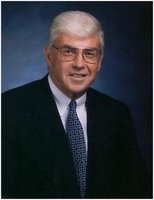 Former Congressman and 1996 Republican Vice Presidential Candidate Jack Kemp is a nationally renowned political leader and commentator offering innovative solutions on issues ranging from tax policy to urban development. He co-founded Empower America and served as a Co-Director of from 1993 to 2004, and will continue to serve as one of three Chairmen at FreedomWorks.
Former Congressman and 1996 Republican Vice Presidential Candidate Jack Kemp is a nationally renowned political leader and commentator offering innovative solutions on issues ranging from tax policy to urban development. He co-founded Empower America and served as a Co-Director of from 1993 to 2004, and will continue to serve as one of three Chairmen at FreedomWorks.Jack Kemp graduated from Occidental College in 1957 and became one of professional football's top quarterbacks, leading the Buffalo Bills to league championships in 1964 and 1965. During his football career, Mr. Kemp was captain of the San Diego Chargers and the Buffalo Bills, and he was named the AFL’s Most Valuable Player. Mr. Kemp also founded the AFL Players Association and was elected its president five times.
After retiring from professional football in 1970, Mr. Kemp was elected to Congress and served nine consecutive terms. A passionate advocate for the broad application of conservative principles, Congressman Kemp broke ranks with many of his House colleagues by vigorously supporting civil-rights legislation and tax incentives for economic development in poor urban areas. He also served for seven years in the Republican Leadership as Chairman of the House of Republican Conference.
Mr. Kemp ran for the Republican Presidential nomination in 1988, and his principled campaign resulted in his appointment as the Secretary of Housing and Urban Development in the George Bush Administration, where he helped restore an agency long tainted by scandal and mismanagement. Secretary Kemp drove the creation of successful Enterprise Zones legislation to encourage entrepreneurship, home ownership, and job creation in urban America .
When he left the first Bush Administration, Secretary Kemp became the co-director of Empower America , a public policy and advocacy organization he co-founded in 1993 with Dr. William Bennett and former U.N. Ambassador Jeane Kirkpatrick. Secretary Kemp also served as chairman of the National Commission on Economic Growth and Tax Reform in 1995, which produced widely acclaimed recommendations for reform of the U.S. tax code. His accomplishments and reputation for broad-minded leadership earned him the Republican nomination for Vice President of the United States in 1996, forming the Dole-Kemp ticket.
In 2000, Jack Kemp began writing a national syndicated column for the Copley News Service and is a regular television news commentator and contributor. He also serves as global chairman of the More Than Houses Campaign for Habitat for Humanity International, and is on the boards of numerous Internet and technology companies.
Newt Gingrich - Biography
 Newt Gingrich was the author of the Contract with America, the concept which is widely credited with leading to the 1994 Republican takeover of the US House of Representatives. Gingrich was elected Speaker of the House of Representatives by his Republican colleagues and served in that role until 1999 after the Clinton sex perjury scandal ended in negative public reaction to the Republican led impeachment of the President and problems at the polls for Republicans in the 1998 elections.
Newt Gingrich was the author of the Contract with America, the concept which is widely credited with leading to the 1994 Republican takeover of the US House of Representatives. Gingrich was elected Speaker of the House of Representatives by his Republican colleagues and served in that role until 1999 after the Clinton sex perjury scandal ended in negative public reaction to the Republican led impeachment of the President and problems at the polls for Republicans in the 1998 elections.Gingrich is the author of 9 books including Winning The Future: A 21st Century Contract with America and Never Call Retreat : Lee and Grant: The Final Victory.
Gingrich holds a bachelor’s degree from Emory University and a Master’s from Tulane. He also holds a Doctorate in Modern European History from Tulane and worked as a history professor before entering politics.
Gingrich is a free market environmentalist who was endorsed by his local Sierra Club chapter and the League of Conservation Voters in his early Congressional races.
Mitt Romney - Biography
 Mitt Romney is the Republican Governor of Massachusetts. Romney is perhaps best known for taking charge of the Salt Lake Organizing Committee for the 2002 Winter Olympics in 1999 after the bribery scandal and leading a very successful organization.
Mitt Romney is the Republican Governor of Massachusetts. Romney is perhaps best known for taking charge of the Salt Lake Organizing Committee for the 2002 Winter Olympics in 1999 after the bribery scandal and leading a very successful organization.Romney has been a highly successful executive in business and government. He was Vice President, then CEO of Bain and Company. In 1984, he founded venture capital firm Bain Capital which “founded, acquired or invested in hundreds of companies including Staples, Bright Horizons Family Solutions, Domino’s, Sealy, Brookstone, and The Sports Authority.”
Governor Romney received his BA with Highest Honors from Brigham Young University in 1971. In 1975, he was awarded an MBA from Harvard Business School and was named a Baker Scholar. In 1975, he also received his Juris Doctorate, cum laude, from Harvard Law School.
Condoleezza Rice - Biography
 Rice is the top ranked administration official who hasn’t ruled out a run. The architect of Afghanistan’s and Iraq’s freedom.
Rice is the top ranked administration official who hasn’t ruled out a run. The architect of Afghanistan’s and Iraq’s freedom.Condoleezza Rice is the 66th United States Secretary of State. She became Secretary of State on January 26. 2005. Prior to becoming Secretary of State, Dr. Rice served as Assistant to the President for National Security Affairs, commonly referred to as the National Security Advisor.
Rice also served in the administration of the first President Bush as Director and Senior Director of Soviet and East European Affairs in the National Security Council, and a Special Assistant to the President for National Security Affairs. She also served in the State Department in 1977, during the Carter administration, as an intern in the Bureau of Educational and Cultural Affairs.
Rice was a tenured Professor of Political Science at Stanford University, Senior Fellow of the Institute for International Studies, and a Fellow (by courtesy) of the Hoover Institution. From 1993 to 1999, she served as Provost of Stanford University. She also served on the board of numerous corporations and foundations including Charles Schwab and Chevron.
Rice was born in Birmingham, Alabama on November 14, 1954. Her father was a guidance counselor and Presbyterian minister. Her mother was a teacher.
Rice holds a bachelor’s degree in political science from the University of Denver, which she received cum laude at the age of 19. She has a master’s degree from the University of Notre Dame and a Ph.D. from the Graduate School of International Studies at the University of Denver.
Rice has said that her major career goal is to be Commissioner of the National Football League. She is an accomplished classical pianist and in addition to English, she speaks Russian, French, and Spanish.
Rudy Giuliani - Biography
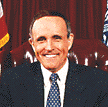
Rudy Giuliani:Rudolph William Louis Giuliani III, more commonly known as “Rudy”, was the Republican Mayor of New York from January 1, 1994 to December 31, 2001. After the September 11 terrorist attacks when Mayor Giuliani’s strength and hard work gave comfort to his town and earned him the title “America’s Mayor”, he was named Time’s Person of the Year for 2001.
Giuliani graduated from Bishop Loughlin Memorial High School in Brooklyn in 1961, from Manhattan College in the Bronx in 1965 and New York University Law School in Manhattan, magna cum laude, in 1968.
Giuliani worked in the office of the US Attorney from 1970 to 1975, served as Associate Deputy Attorney General and chief of staff to the Deputy Attorney General from 1975 to 1977 and practiced law privately from 1977 to 1981. He served as Associate Attorney General from 1981 to 1983 and was appointed US Attorney for the Southern District of New York in 1983. As US Attorney, he made a name for himself with his prosecution of Mike Milken and the plea bargain he forced by bringing charges against Milken family members, a tactic usually reserved for organized crime figures.
Giuliani has been a guest and host on Saturday Night Live on several occasions and is well known for his acerbic sense of humor.
Senator George Allen - Biography

Senator George Allen is working tirelessly in the U.S. Senate to make Virginia and America a better place to live, learn, work and raise a family. A self-described “common sense Jeffersonian Conservative”, Senator Allen trusts free people and free enterprise.
Senator Allen has set clear priorities during his first term in the United States Senate:
Strengthening and supporting America's national defense and homeland security.
Increasing the competitiveness of Virginia and the U.S. for investment and quality, good-paying jobs.
Advocating and embracing policies to make America a leader in the advancement of technology.
Reducing the tax burden on families and small business owners.
As a member of the influential Commerce, Science and Transportation Committee, as well as the Small Business and Entrepreneurship Committee, Senator Allen has made the creation of quality, good paying jobs in the Commonwealth his focus. Because of his experience and work with the tremendous high-tech presence in Virginia, Senator Allen was appointed in 2001 to serve as Chairman of the Senate High Tech Task Force where he continued to advocate policies to make America a leader in innovation from nanotechnology to broadband to the education of future engineers and scientists. In 2004, the Senate passed Allen’s Internet Tax Nondiscrimination Act, legislation which extends the ban on multiple and discriminatory taxation on the Internet until October 31st 2007. The bill specifically bans three types of taxes that unfairly single out the Internet, including regressive taxes on Internet access, multiple taxation (for example, by two or more States) of a product or service bought over the Internet, and discriminatory taxes that treat Internet purchases differently from other types of sales.Senator Allen is also working to secure America from foreign threats. Given the global security challenges of the 21st century, Senator Allen brings his knowledge of Virginia’s defense industry and key military assets to bear as a member of the Senate Foreign Relations Committee – the Senate committee charged with the consideration of treaties and the declaration of war.
-->
Senator Allen is also working hard to secure America from foreign threats. Given the global security challenges of a post September 11th world, Senator Allen brings his knowledge of Virginia’s defense industry and key military assets to bear as a member of the Senate Foreign Relations Committee – the Senate committee charged with the consideration of treaties and the declaration of war. He currently serves as the Chairman of the Foreign Relation Committee’s Subcommittee on European Affairs. As a member of the Foreign Relations Committee, the Senator has consistently stood strong with the brave men and women who serve in our Armed Forces as they fight to protect our freedoms around the world. Senator Allen introduced a bill in Congress in 2005 to do more for the families of soldiers killed in service of their country by raising the death benefit for “next of kin” from $12,000 to $100,000.
In 2005, Senator Allen was also appointed to serve on the Energy and Natural Resources Committee where he is working to reduce America’s over-dependence on foreign oil and shape a national energy plan that strikes a careful balance between our environmental and energy security needs for families and communities in Virginia and all of America.
Prior to his election to the Senate, Senator Allen served as the 67th Governor of Virginia from 1994-1998. As Governor, he won wide recognition for educational improvements such as the implementation of rigorous academic standards and accountability. Several other hallmarks of Senator Allen’s tenure as Governor include the overhaul of an outdated juvenile justice system, work-oriented welfare reform and the abolition of parole for felons. Senator Allen is also widely credited with bringing a record $14 billion of private sector investment along with hundreds of thousands of jobs to Virginia through the expansion and relocation of technology and manufacturing companies.
Bringing the same innovative, constructive leadership to Washington, Senator Allen was unanimously elected a member of the Senate Republican Leadership as Chairman of the National Republican Senatorial Committee in 2002. In the 2004 election, under Senator Allen’s leadership, Republicans picked up four seats in the U.S. Senate.
Senator Allen holds a B.A. in History with distinction as well as a law degree from the University of Virginia. He and his wife, Susan, reside near Mt. Vernon in Fairfax County with their three children: Tyler, Forrest, and Brooke.
Senator George Allen
Professional:
2001 – Present 51st United States Senator from Virginia
1994 – 1998 67th Governor of the Commonwealth
1991 – 1993 U.S. Representative, elected in a special election
1983 – 1991 Virginia House of Delegates
Personal:
Birth date: March 8, 1952
Family: Married, Susan
Three children, Tyler, Forrest and Brooke
Resides: Mt. Vernon, Virginia
Political Heroes: Thomas Jefferson, Ronald Reagan
Senator Allen has set clear priorities during his first term in the United States Senate:
Strengthening and supporting America's national defense and homeland security.
Increasing the competitiveness of Virginia and the U.S. for investment and quality, good-paying jobs.
Advocating and embracing policies to make America a leader in the advancement of technology.
Reducing the tax burden on families and small business owners.
As a member of the influential Commerce, Science and Transportation Committee, as well as the Small Business and Entrepreneurship Committee, Senator Allen has made the creation of quality, good paying jobs in the Commonwealth his focus. Because of his experience and work with the tremendous high-tech presence in Virginia, Senator Allen was appointed in 2001 to serve as Chairman of the Senate High Tech Task Force where he continued to advocate policies to make America a leader in innovation from nanotechnology to broadband to the education of future engineers and scientists. In 2004, the Senate passed Allen’s Internet Tax Nondiscrimination Act, legislation which extends the ban on multiple and discriminatory taxation on the Internet until October 31st 2007. The bill specifically bans three types of taxes that unfairly single out the Internet, including regressive taxes on Internet access, multiple taxation (for example, by two or more States) of a product or service bought over the Internet, and discriminatory taxes that treat Internet purchases differently from other types of sales.Senator Allen is also working to secure America from foreign threats. Given the global security challenges of the 21st century, Senator Allen brings his knowledge of Virginia’s defense industry and key military assets to bear as a member of the Senate Foreign Relations Committee – the Senate committee charged with the consideration of treaties and the declaration of war.
-->
Senator Allen is also working hard to secure America from foreign threats. Given the global security challenges of a post September 11th world, Senator Allen brings his knowledge of Virginia’s defense industry and key military assets to bear as a member of the Senate Foreign Relations Committee – the Senate committee charged with the consideration of treaties and the declaration of war. He currently serves as the Chairman of the Foreign Relation Committee’s Subcommittee on European Affairs. As a member of the Foreign Relations Committee, the Senator has consistently stood strong with the brave men and women who serve in our Armed Forces as they fight to protect our freedoms around the world. Senator Allen introduced a bill in Congress in 2005 to do more for the families of soldiers killed in service of their country by raising the death benefit for “next of kin” from $12,000 to $100,000.
In 2005, Senator Allen was also appointed to serve on the Energy and Natural Resources Committee where he is working to reduce America’s over-dependence on foreign oil and shape a national energy plan that strikes a careful balance between our environmental and energy security needs for families and communities in Virginia and all of America.
Prior to his election to the Senate, Senator Allen served as the 67th Governor of Virginia from 1994-1998. As Governor, he won wide recognition for educational improvements such as the implementation of rigorous academic standards and accountability. Several other hallmarks of Senator Allen’s tenure as Governor include the overhaul of an outdated juvenile justice system, work-oriented welfare reform and the abolition of parole for felons. Senator Allen is also widely credited with bringing a record $14 billion of private sector investment along with hundreds of thousands of jobs to Virginia through the expansion and relocation of technology and manufacturing companies.
Bringing the same innovative, constructive leadership to Washington, Senator Allen was unanimously elected a member of the Senate Republican Leadership as Chairman of the National Republican Senatorial Committee in 2002. In the 2004 election, under Senator Allen’s leadership, Republicans picked up four seats in the U.S. Senate.
Senator Allen holds a B.A. in History with distinction as well as a law degree from the University of Virginia. He and his wife, Susan, reside near Mt. Vernon in Fairfax County with their three children: Tyler, Forrest, and Brooke.
Senator George Allen
Professional:
2001 – Present 51st United States Senator from Virginia
1994 – 1998 67th Governor of the Commonwealth
1991 – 1993 U.S. Representative, elected in a special election
1983 – 1991 Virginia House of Delegates
Personal:
Birth date: March 8, 1952
Family: Married, Susan
Three children, Tyler, Forrest and Brooke
Resides: Mt. Vernon, Virginia
Political Heroes: Thomas Jefferson, Ronald Reagan
U.S. Senator John McCain - Biography
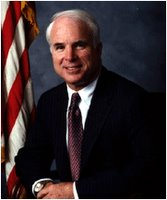
U.S. Senator John McCain has a long career of public service. After graduating from the Naval Academy in 1958, John McCain began his career as a Naval aviator. In 1982, he was elected to Congress representing what was then the first congressional district of Arizona. In 1986, he was elected to the United States Senate to take the place of Arizona's great Senator Barry Goldwater. Senator McCain is currently the senior senator from Arizona. In 2000, McCain ran unsuccessfully for the Republican nomination for President of the United States. He is currently the Chairman of the Senate Committee on Indian Affairs, and serves on the Armed Services, and Commerce, Science, and Transportation Committees. Senator McCain has seven children and four grandchildren. He and his wife, Cindy, reside in Phoenix.
lunes, diciembre 05, 2005
THE KEY TO THE COMING CRISIS OF CONSERVATISM
 By Newt Gingrich
By Newt GingrichReal change requires real change.
Presiding over the inherited bureaucracies, structures, and laws of the left is an inadequate basis for a long term governing majority.
Things are not working in part because the bureaucracies, regulations and systems of the left simply no longer work. The first and greatest challenge for conservatives is to understand that presiding over and defending the left’s institutions is a prescription for failure.
The Social Security transfer payment model which worked fine when there were 42 working taxpayers for every Social Security recipient (the first year checks were paid) simply will not work when there are only two working taxpayers for every retiree (when my grandchildren enter the work force).
The bureaucratic intelligence system which focused on an even more bureaucratic Soviet Union is simply incapable of staying in touch with and analyzing the modern real time world with its diverse power centers and multiple challenges. The education system which worked well for middle class students whose parents reinforced the teacher has failed more and more expensively in both human and money terms. A bureaucracy which spends billions outside the classroom is a bureaucracy conservatives should be transforming not increasing.
The irresponsible 1965 model of Medicaid is begging for the kind of profound transformation which was applied to welfare in 1996 (with the result that 60% of the people on welfare quit their habit of dependency and either went to work or went to school). The model of bureaucratic public administration was codified by the civil service laws of the 1880s when male clerks using quill pens sat on high stools. For 120 years this system has evolved into greater and greater layers of red tape and inefficient processes. No amount of reform will make bureaucratic public administration as accurate, efficient, and flexible as UPS or Fedex. Yet these companies are the standards of implementation which people have come to expect in their daily life. It is government which is now the obsolete, inefficient, expensive, and frustrating outlier. The American people instinctively know that things are not working.
When there are more than 11 million illegal immigrants and the number rises each day things are not working. When a man carrying a knife, axe, sword and power saw with blood on it is admitted by border guards to the U.S. from Canada things are not working. When the Supreme Court shatters private property rights on behalf of often corrupt city governments things are not working.
When the gap between Chinese and Indian students in math and science and their American counterparts remains devastatingly large after 22 years of reform (beginning with A Nation at Risk in 1983) things are not working. When the demographic realities of living longer create clear requirements for transformation in health and pension policy and the political system simply finds it impossible to have an honest dialogue about the challenges of success (fewer people dying and more people living longer is a great success not a problem) it is clear things are not working.
When four years into the Long War with the Irreconcilable Wing of Islam the Bureau of Prisons has to be embarrassed publicly into hiring its first Arabic translator things are not working. When the United States energy supply relies on anti-American semi-dictators in Venezuela and dictatorships in Saudi Arabia, Libya, Iran, and Kazakhstan and an unfriendly Russian government to keep supply large enough and price low enough with no coherent American strategy for energy security things are not working.
When the amount of debt held by foreigners mounts each year and the relative productive capacity of Asian countries grows steadily larger without an effective American strategy for competing and succeeding things are not working. When housing has become a bubble with no down payments, no payments on principle and in some cases not even complete payment on interest a looming threat to the entire economy exists and clearly things are not working.
The list could go on and on.
The United States faces a lot of challenges. Meeting these challenges is going to require a general strategy of continuing transformation across a wide range of very important and very difficult topics. It will be impossible to govern successfully by trying to solve one or two problems at a time. That approach will guarantee that some zones break down catastrophically (an energy crisis, a housing price collapse, a terrorist attack of large proportions, etc), while the focus is on the selected limited group.
Governing in a time of dramatic change requires a parallel commitment to transformation on many fronts simultaneously.
domingo, diciembre 04, 2005
Navidad Estadista Carolinense
 Por Antonio Velázquez
Por Antonio VelázquezEste domingo 4 de diciembre de 2005, se celebro el nacimiento del niño Jesús en la Asociación de miembros de la policia. Todo el liderato Estadista de Carolina estubo presente entre ellos el Vice-presidente de la Camara Epi Jr, Sergio Estevez, presidente del precinto 107 de Carolina. La actividad fue una muy concurrida en donde se hizo una mención especial a la comunicadora Carmen Santiago. En esta ocasión asistio a la fiesta el ex-presidente del Partido Nuevo Progresista, Leo Diaz Urbina, quien dio un discurso inspirador como es acostumbrado. La fiesta fue muy alegre y con un "Christmas feeling" enorme.


